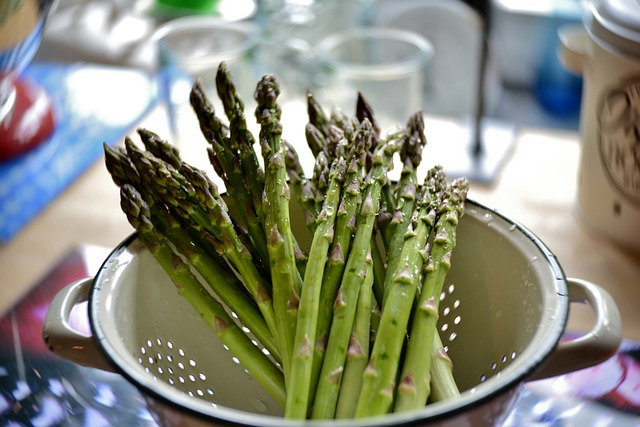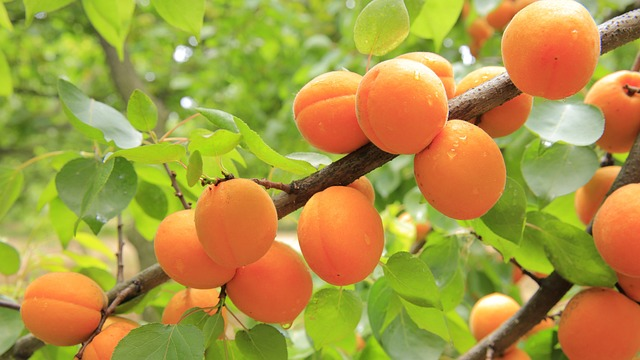There's a compound called asparagine in asparagus which is a natural diuretic that breaks up oxalic and uric acid crystals stored in muscles and the kidneys and eliminates them through the urine. This natural diuretic is helpful in reducing water retention, bloating, and swelling in the body.
Asparagus is also high in glutathione which is an antioxidant powerhouse and particularly beneficial for those suffering with autoimmune conditions, liver disease, heart disease, cancer, and diabetes. It's known to help strengthen the liver, kidneys, skin, ligaments, and bones and its chlorophyll content makes it a great blood builder.
Asparagus also contains inulin which encourages good bacteria in the gut that boosts nutrient absorption and helps to keep the immune system functioning properly.
Asparagus is a delicious vegetable packed with nutrients that can be added to soup, stews, rice, and/or veggie dishes.
Be sure to COOK TILL TENDER because RAW VEGETABLES STEAL IODINE FROM THE BODY AND THE ENZYMES ARE NOT RELEASED FOR PROPER MINERAL ABSORPTION.
HEALTH BENEFITS OF ASPARAGUS
HOMOCYSTEINE: An abundance of vitamin B in asparagus helps in maintaining healthy levels of homocysteine, which is produced in the blood when an amino acid (methionine) breaks down in the body.
Vitamin B, especially folate, B6 and B12 are essential for converting homocysteine into cysteine, which then gets converted back to methionine as per the normal methylation cycle. Deficiency of vitamin B in the body can elevate the levels of homocysteine in the blood. Raised levels of homocysteine can pose a threat of serious ailments like the damage of blood vessels, venous thrombosis in which clotting of blood happens in the veins, and atherosclerosis, which can all further lead to cardiac disorders. In addition to this, vitamin B is also responsible for the metabolism of starches and sugars in the body and therefore helps in maintaining healthy levels of blood sugar.
PREGNANCY: The high folate content in asparagus aids in reducing the danger of low birth weight and birth defects during pregnancy. Folate is essential for the neuronal growth of the fetus. It also helps in reducing the complication of edema or retention of water in the body tissues owing to its diuretic effect.
PMS: An asparagus extract can be used effectively for easing pre-menstrual bloating. The presence of essential nutrients helps to combat depression and fatigue, as well as reduce menstrual cramps. Asparagus also helps in controlling blood loss and maintaining hormonal balance during menstruation.
FERTILITY: The root of asparagus racemosus is widely appreciated in Ayurvedic therapy and is famously known as shatavari, which means ‘one who has 100 husbands’. Shatavari has aphrodisiac properties and is used to regulate the hormones and cure male and female sexual disorders. It has anti-anxiety properties and helps in curing physical and mental debility in males. It also helps in enhancing the libido and boosts sperm count and its motility. In females, asparagus has been proven to be effective in menopausal syndrome and anemia. Shatavari has been trusted as a galactogogue and is also valued for its effectiveness in improving the quality and quantity of the breast milk, while boosting the appetite of nursing women. Research studies conducted on animals have demonstrated positive effects on the genitals and the mammary glands of the subject females who consumed adequate amounts of asparagus.
DIGESTIVE HEALTH: Asparagus contains significant quantities of the nutrient inulin. Inulin is a kind of complex carbohydrate that is commonly known as prebiotic. It does not get digested until it reaches the large intestine, where it is fed upon by a kind of good bacteria like Lactobacilli. This aids in the improved absorption of nutrients and the reduced risk of stomach cancer and allergies.
Asparagus is also a good provider of dietary fiber and has laxative properties that help in the smooth functioning of the bowels, keeping bloating and constipation at bay. Along with healthy digestion, fiber also helps in lowering the cholesterol levels of the body. Asparagus is widely recommended in Ayurvedic therapy for its effectiveness in curing diarrhea, dysentery, and dyspepsia, which is a feeling of abdominal uneasiness including burning sensations or navel pain occurring during or after eating. Studies have shown that asparagus racemosus has been proven to be just as effective as the commercially available modern drugs in treating dyspepsia.
ANTI-TUMOR PROPERTIES: Asparagus racemosus, or wild asparagus, contains a certain variety of phytonutrients known as saponins. Studies have demonstrated that the saponins obtained from asparagus possess anti-cancer and anti-inflammatory properties.
Along with the chemo-preventive efficiency, asparagus also helps in elevating the levels of glutathione, an antioxidant and a detoxifying compound which plays a major role in aging and helps in the prevention of many diseases like HIV, AIDS, cystic fibrosis, Alzheimer’s disease, anemia, cancer, diabetes, and various cardiac disorders.
DIABETES: The anti-inflammatory nutrients present in asparagus help in reducing the risk of chronic health ailments, including type 2 diabetes. This beneficial effect is also attributed to the presence of the mineral chromium, which plays a vital role in regulating the blood sugar levels of the body. Studies conducted in this regard have shown significant results and have proven that asparagus helps in keeping a check on blood sugar levels, improves insulin secretion, and provides an anti-diabetic effect.
CATARACTS: Asparagus is a source of vitamin A, which is essential for good vision. Due to the presence of antioxidants, it helps in defending the retina from the damage caused by the oxygen-free radicals. The presence of the amino acid glutathione in asparagus also helps in reducing the risk of eye ailments such as cataracts and night blindness.
RHEUMATISM: Rheumatoid arthritis is a chronic condition that causes inflammation of the joints. Studies have shown that the consumption of folate-rich food like asparagus, which also possess anti-inflammatory properties, may help relieve the pain and ease the overall poor functioning in the body associated with arthritis.
RUTIN: Asparagus is also a rich source of rutin, a flavonoid that possesses anti-inflammatory properties and is used to treat hemorrhoids and prevent the clotting of blood. It also enhances the permeability of capillaries, strengthens the blood vessels and protects them from becoming fragile. Rutin also prevents the hardening of arteries by reducing the viscosity of blood and helps in easing hypertension, reducing cholesterol, and maintaining cardiovascular health.
TUBERCULOSIS: Asparagus racemosus is also known for its effectiveness in curing bronchitis and tuberculosis. It improves the efficiency of the functioning of lung tissues and helps in treating throat infections as well.
NEURODEGENERATIVE DISEASES:
Neurodegenerative diseases are genetic or periodic conditions affecting the neurons of the human brain. The body does not normally have the ability to replace the damaged neurons. Studies have provided evidence that asparagus racemosus is effective in treating neurodegenerative diseases like Alzheimer’s, Parkinson’s, and Huntington’s diseases. These beneficial effects are attributed to the presence of phytoestrogens in asparagus racemosus that have certain neuroprotective effects.
ANTI-DEPRESSANT DRUG: Scientific research has shown the efficacy of asparagus racemosus as an anti-anxiety and anti-depressant drug. It helps in enhancing the memory, increases the production and secretion of estrogen, and has a revitalizing and calming effect on the nervous system.
EPILEPSY: Epilepsy is a chronic disorder that affects the brain and leads to recurrent convulsions or seizures. The brain transmits abnormal signals as a result of irreversible changes in the brain tissues. The roots of asaparagus racemosus can be used as an anti-epileptic and helps in curing the symptoms of epilepsy.
URINARY TRACT INFECTIONS: Research studies show that asparagus racemosus possess anti-urolithiatic effect, which helps to cure urinary tract infections. Due to the vegetable’s diuretic properties, consumption of asparagus increases the frequency and volume of urination. This helps to detoxify and flush the toxic waste out of the body. According to the research, the anti urolithiatic effect can be attributed to the presence of antioxidants and essential vitamins C and E.
Asparagus is also known to give a peculiar, pungent smell to the urine, which is completely normal. This is because asparagus breaks down its constituents of ammonia and sulphur into volatile chemical compounds that actually help the body to detoxify.
BLOOD CHOLESTEROL: Studies have supported the fact that the wealth of anti-oxidants in asparagus has the potential to treat oxidative stress, along with other disorders such as hyperlipidemia and hypercholesterolemia. These diseases indicate the presence of high fat and cholesterol content in the body, which can further pose a major threat for fatal conditions like cardiovascular diseases and atherosclerosis.
CULINARY USAGE: Asparagus has a delicate flavor and can be eaten grilled, or roasted. It can be added as an ingredient stew, stir fry, salad recipes, and various soups. The shoots of the asparagus plant are relished as an appetizer and are prepared in many different ways around the world.



